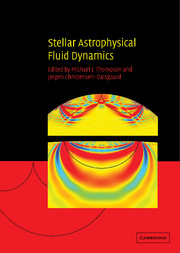Book contents
- Frontmatter
- Contents
- Preface
- 1 A selective overview
- I Stellar convection and oscillations
- 2 On the diversity of stellar pulsations
- 3 Acoustic radiation and mode excitation by turbulent convection
- 4 Understanding roAp stars
- 5 Waves in the magnetised solar atmosphere
- II Stellar rotation and magnetic fields
- III Physics and structure of stellar interiors
- IV Helio- and asteroseismology
- V Large-scale numerical experiments
- VI Dynamics
3 - Acoustic radiation and mode excitation by turbulent convection
Published online by Cambridge University Press: 11 November 2009
- Frontmatter
- Contents
- Preface
- 1 A selective overview
- I Stellar convection and oscillations
- 2 On the diversity of stellar pulsations
- 3 Acoustic radiation and mode excitation by turbulent convection
- 4 Understanding roAp stars
- 5 Waves in the magnetised solar atmosphere
- II Stellar rotation and magnetic fields
- III Physics and structure of stellar interiors
- IV Helio- and asteroseismology
- V Large-scale numerical experiments
- VI Dynamics
Summary
For many years the principle source of excitation of oscillations in solar-like stars was under considerable debate. This was related to the fact that mode stability in such stars is governed not only by the perturbations in the radiative fluxes (via the κ-mechanism) but also by the perturbations in the turbulent fluxes (heat and momentum). The study of mode stability therefore demands a theory for convection that includes the interaction of the turbulent velocity field with the pulsation. It is now widely believed that the observed low-amplitude oscillations in the Sun are determined by the balance between the stochastic driving due to the acoustic radiation by turbulent convection and the damping of the intrinsically stable p modes. Acoustic radiation by turbulence also effects the stratification of the equilibrium model by reducing the estimated convective velocities and consequently influencing oscillation properties. In this contribution I review the mechanisms responsible for mode damping in solar-type stars and for stochastic driving by turbulent convection. Amplitude predictions for models of the Sun and β Hydri are compared with observations. Finally I discuss the effect of acoustic radiation by turbulence on the retardation of the convective velocities in solar-type stars with masses 1.0 – 1.9M⊙ and on mode stability in a Delta Scuti star of 1.65M⊙.
- Type
- Chapter
- Information
- Stellar Astrophysical Fluid Dynamics , pp. 39 - 50Publisher: Cambridge University PressPrint publication year: 2003



